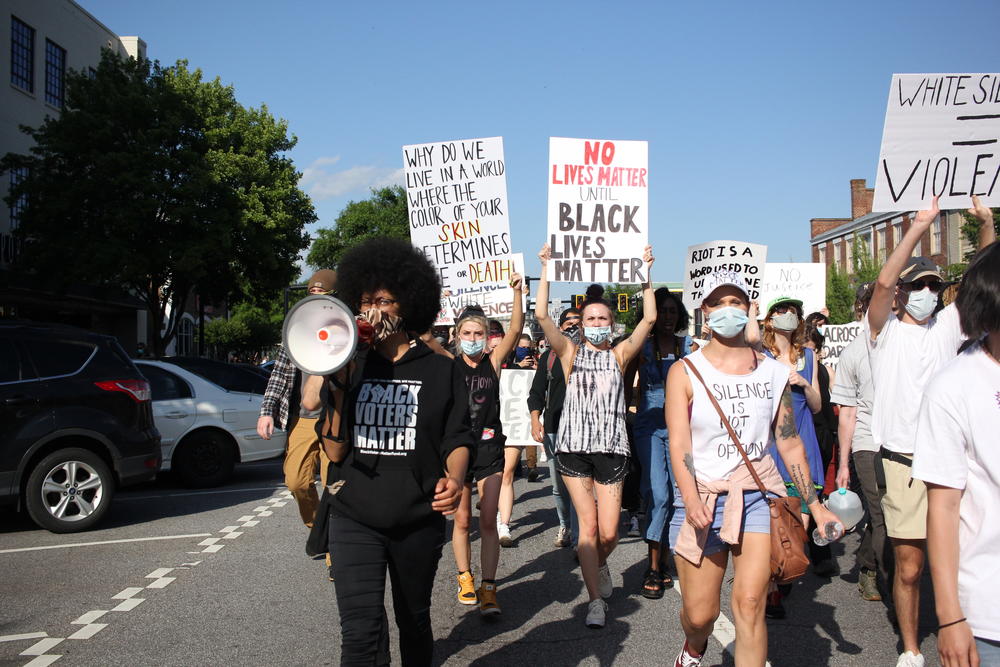Section Branding
Header Content
Athens Commissioner Tests Positive For COVID-19 After Protest, Health Experts Urge Testing
Primary Content
After testing positive for coronavirus, Athens-Clarke County District 2 Commissioner Mariah Parker will not be attending any protests until her two-week quarantine is up. Parker was one of the organizers of a march on Sunday, May 31, that attracted over a thousand people to downtown Athens.
“I'm really proud of the level of organization we brought on Sunday,” Parker said. “One thing that marshals could do better at future actions is enforcing social distancing … our marshals were mainly keeping people along the marching path and de-escalating conflicts in the crowd and keeping people safe.”
During Sunday’s protest, Parker encouraged attendees to distance themselves. Her message was primarily lost as people crowded together on the streets and sidewalks. After receiving her results on Wednesday evening, Parker encouraged her followers on social media to get tested as well, especially if they had gotten near her at the protest.
The Athens-Clarke County Mayor and Commission passed a resolution on Tuesday evening during a virtual meeting strongly encouraging all residents, visitors and business owners and employees to use face coverings in public. But health concerns regarding large group gatherings remain, even if people wear masks. According to Grace Bagwell Adams, a University of Georgia associate professor of Health Policy and Management, there is no safe way to protest in person.
“If you were standing within six feet of someone for more than 15 minutes, you’re at risk, and that's with a mask on,” Adams said. “They're a public health tool, but it is not something that should make people comfortable.”
There are safer ways to do things, though. Adams emphasized vigilance and diligent sanitation for those gathering in large groups, as well as masks. Silent protests may also help limit the spread of air particles compared to when people chant or shout. The safest way to attend protests, however, is to get tested before and after. The Department of Public Health can be contacted at (844)-442-2681 for anyone interested in finding nearby testing locations.
“And it's really important that people get tested even if they don't have symptoms, because we know that so many of our cases, especially in the early days of infection, they are contagious already,” Adams said.
Protests in downtown Athens have continued since Sunday, though in smaller numbers. Local activist organization Athens Anti-Discrimination Movement is planning a second rally against police brutality and the death of George Floyd, Ahmaud Arbery, Breonna Taylor and others who died at the hands of law enforcement for Saturday afternoon. Over one thousand people have responded to the event on Facebook.
Mokah Johnson, co-founder of AADM, said they plan on enforcing social distancing during the protest. Johnson has been in contact with the Athens-Clarke County Police Department and the Mayor and Commission to organize safely. Medical tents near City Hall will provide sanitizer, disposable masks, water bottles and thermometers, and organizers plan on using barricades, tape or markers to keep attendees as separated as possible.
“The reality of the fact is our governor opened up the city,” Johnson said. “And we're just going to do what we can to just encourage people to be mindful.”
Johnson recognizes the effect this pandemic has on activism. She hopes her organizers can live stream Saturday’s rally to encourage high-risk individuals to stay home.
“Even though we are going through a pandemic, and we're encouraged to practice social distancing, we still have to figure out a way to let our voices be heard and to stand up and fight for justice, because we cannot become complacent,” Johnson said.
While coronavirus cases in Georgia haven’t increased exponentially since the state reopened much of its economy in late April, public health officials are warning of a surge in cases following high traffic protests, potentially during the month of June. Cases in some western states have shown a surge in recent weeks.
In a recent press conference Dr. Kathleen Toomey, the commissioner of the Georgia Department of Public Health, said her agency is working with local leaders, including Atlanta Mayor Keisha Lance-Bottoms, to test first responders and others. Bottoms also told protestors, “If you were out protesting last night, you probably need to go get a COVID test this week. There is still a pandemic in America that’s killing black and brown people at higher numbers.”
The data shows this pandemic has disproportionately affected low income communities, including many majority black communities across the state and country. As thousands publicly demand justice for the oppressed, Adams said it’s important to consider that Georgia has many communities that “can’t afford hotspots” of infection.
“I think that we can all always do a better job with communicating and making sure that we're very clear with the public, across multiple media, that the pandemic has not gone anywhere, and that there is an intersection between the pandemic and these protests that we need to consider and to plan for,” Adams said. “Because if we do not, then we're opening ourselves to more hotspots and overwhelming our healthcare system.”
Adams has been working closely with the Athens-Clarke County Mayor and Commission as a member of a health advisory group. These conversations with local officials have included emergency response planning and ways in which the local government can further push public health messaging regarding testing.


